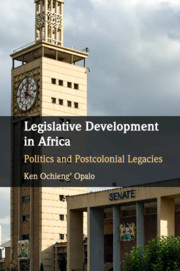Book contents
- Frontmatter
- Dedication
- Contents
- List of Figures
- List of Tables
- Preface
- Acknowledgements
- 1 Introduction
- 2 Legislative Development in Africa
- 3 Intra-Elite Politics and Credible Commitment
- 4 Colonial Origins of Parliaments in Kenya and Zambia
- 5 Elite Control and Legislative Development
- 6 Legislative Institutionalization in Time
- 7 Electoral Politics and Legislative Independence
- 8 Conclusion
- References
- Index
7 - Electoral Politics and Legislative Independence
Published online by Cambridge University Press: 17 June 2019
- Frontmatter
- Dedication
- Contents
- List of Figures
- List of Tables
- Preface
- Acknowledgements
- 1 Introduction
- 2 Legislative Development in Africa
- 3 Intra-Elite Politics and Credible Commitment
- 4 Colonial Origins of Parliaments in Kenya and Zambia
- 5 Elite Control and Legislative Development
- 6 Legislative Institutionalization in Time
- 7 Electoral Politics and Legislative Independence
- 8 Conclusion
- References
- Index
Summary
As the primary means of entry into legislatures, elections are a key pillar of legislative institutionalization and independence. Politically independent legislators are the foundation of legislative institutional independence. This chapter examines the electoral sources of legislative strength in Kenya and Zambia. In doing so it outlines the incentives faced by legislators both during and after the end of single-party rule. The evidence suggests that Kenyan and Zambian legislators experienced higher levels of incumbency advantage under multipartyism than under single-party rule. I argue that under single-party rule, intra-elite competition for legislative posts took place in the shadow of chief executives. Through the ruling party, presidents in Kenya and Zambia could make and unmake legislators’ political careers. As such, individuals could not invest in robust bases of political support. Political independence could be seen as an attempt to challenge the president. The lack of a localized personal vote exposed Kenyan and Zambian incumbent legislators to challengers – the result being very high turnover rates. The end of single-party rule changed this dynamic. Freed from the monopoly of single-party rule, legislators could freely invest in their reelection without fear of sanction from presidents and outperform comparable challengers.
Keywords
- Type
- Chapter
- Information
- Legislative Development in AfricaPolitics and Postcolonial Legacies, pp. 208 - 238Publisher: Cambridge University PressPrint publication year: 2019

